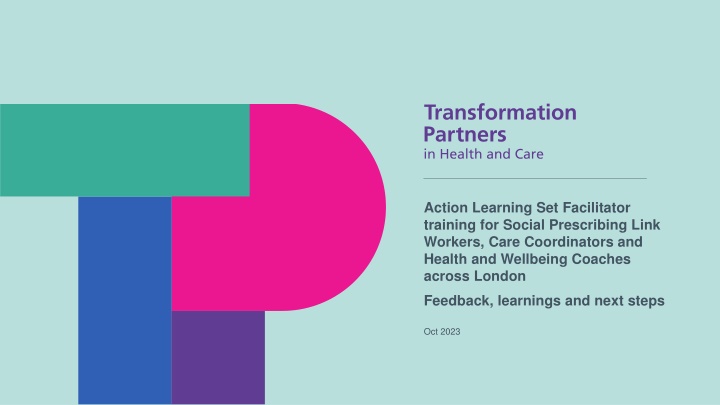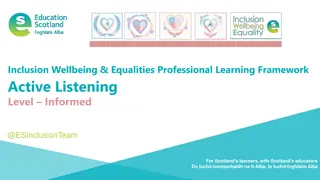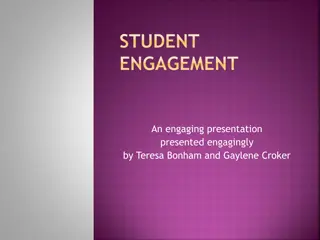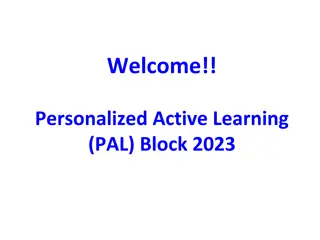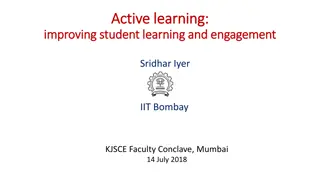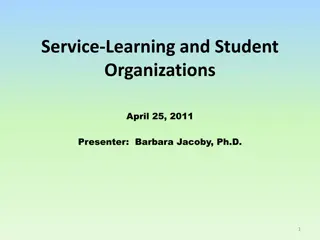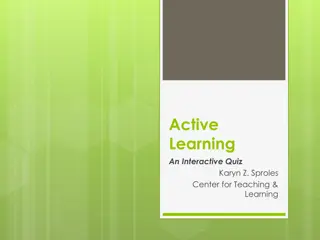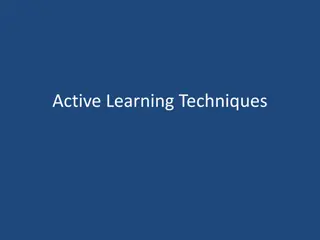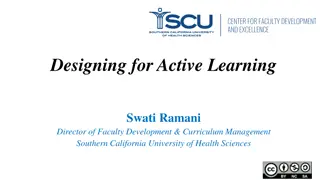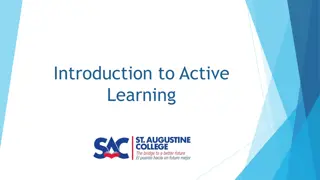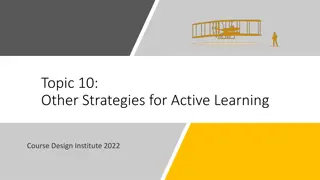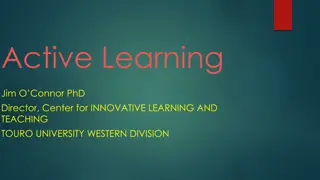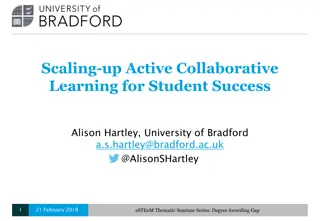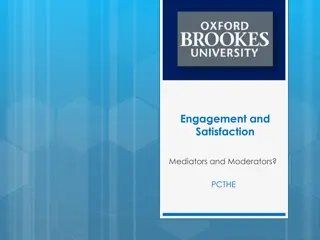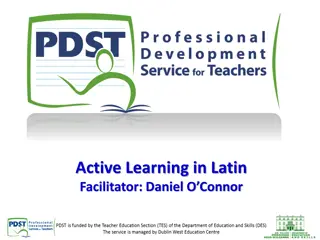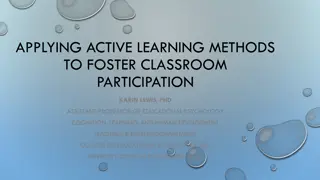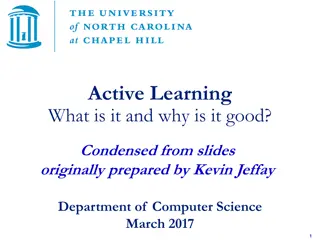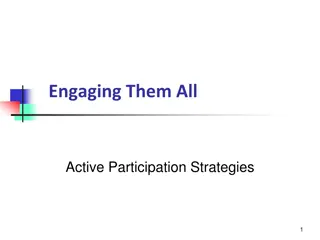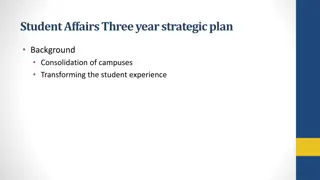Active Learning Techniques for Enhancing Student Engagement
Active learning strategies are highlighted in this showcase, emphasizing the benefits of interactive teaching methods on student performance and attitudes. The program features a variety of activities, from live coding lectures to problem-solving sessions, aimed at fostering deep learning and constructive alignment. The event includes contributions from diverse presenters across different disciplines, promoting student-centered approaches and innovative teaching practices.
Download Presentation

Please find below an Image/Link to download the presentation.
The content on the website is provided AS IS for your information and personal use only. It may not be sold, licensed, or shared on other websites without obtaining consent from the author.If you encounter any issues during the download, it is possible that the publisher has removed the file from their server.
You are allowed to download the files provided on this website for personal or commercial use, subject to the condition that they are used lawfully. All files are the property of their respective owners.
The content on the website is provided AS IS for your information and personal use only. It may not be sold, licensed, or shared on other websites without obtaining consent from the author.
E N D
Presentation Transcript
Action Learning Set Facilitator training for Social Prescribing Link Workers, Care Coordinators and Health and Wellbeing Coaches across London Feedback, learnings and next steps Oct 2023
Background In partnership with NHS Leadership Academy, 14 people across London were trained in Action learning set facilitation. The training was run by Fiona Elder and Lesley Cave, independent trainers who have trained many NHS colleagues in ALS. Why action learning sets? Peer support is a powerful tool to support people working on the frontline of the NHS. It enables people to come together to support each other to problem solve in a safe space. What are Action Learning Sets? Action learning is essentially peer problem solving in a group, which is referred to as a 'set'. It requires a facilitator who will facilitate the structure of the session, a 'thinker' who brings the problem and peers who ask questions of the thinker in different stages. The typical process is on slide 10. Social Prescribing Link Workers, Health and Wellbeing Coaches and Care Coordinators are relatively new roles in the NHS working within a complex landscape. Being non-clinical roles within primary care also has particular challenges. Peer support can be delivered by a number of roles at different levels. However, a sustainable model is one where members of the workforce can facilitate their own peer support. This also supports development, retention and career progression. Action learning sets are a specific type of structured peer support. What makes a good facilitator? Active listening and presence - Maintains agreement and facilitates this within the space - Facilitated growth and awareness - Full competencies are on slide 11.
Who was involved in the training? We worked alongisde ICB and training hub leads to identify people from across their patch who would be appropriate and interested in becoming Action Learning Set facilitators. Out of 18 who signed up, 14 completed the course, they are detailed below. ICB Person SWL Care coordinator Abdihakim Mohamed Health and wellbeing coach Luciana Castorina Gemma Callander SEL Health and wellbeing coach Laura Viner NCL Health and wellbeing coach Rebecca Nix NEL Health and wellbeing coach Caroline Jarrett Charlie Tunmore Social prescribing link worker Raquel Cerezo Martin NWL Health and wellbeing coach Tabitha Buchanan Amy Moore Phoebe Williams Social prescribing link worker Elena Chivieva London regional colleagues - TPHC Social prescribing and community led prevention team Jenny Brooks Homeless health team Liza Collins
What did participants gain from the training? Top areas of learning and development gained were in: As a result, participants are 1. ALS and general facilitation skills More present at work and with people - 2. Communication skills Facilitating and supporting others more effectively - 3. Listening and being present 4. Ability to take a coaching style and not give advice Carrying out more self-reflection - Currently or planning to carry out more ALSs and use it in work activities - What people said in response to 'What is your key learning?' "I have changed the way I facilitate groups in particular. I ask more open questions and feel I am a more confident facilitator. Most importantly to me, is that after an ALS practice session, I completely changed the way I run one of my most long-term groups, to a way that works better for the patients and myself." "How to hold space for others, and furtherdevelop my health coaching skills - how important peer support is through ALS." "How to facilitate an ALS session and how effective the process is and the impact that it creates in the person" "I have developed new communication skills, awareness, presence, a substantial amount of lifelong learning elements that will support my professional and personal life." "Reach out to colleagues across the PCN to find opportunities to get others involved and add value" "I have been using this at weekly team meetings, to openly discuss and resolve programme "
What Action Learning Sets were run and what do participants plan to do next? As part of the course participants ran local Action Learning sets in their own patch, the most common types are listed below: All eleven participants who provided feedback on the course, plan to continue running Action Learning Sets in their local area. 1. Borough or PCN wide with one specific role 2. Personalised care roles in a PCN Specifically, they plan to run them with: 3. Project or team specific group Specific personalised care role in area 4. PCN wide ALS Their team or PCN staff "I run 2 ALS in my workplace and invited both members of the PCN I work for and ALS trainees. I felt that having both internal and external attendees would create a better learning environment for my self and participants." GPs in their PCN "I plan to set one up for the care coordinators in my PCN but also would like to facilitate as peer support for a wider group" "I've run two - one with a group of GPs at a surgery, and another with link workers and Health & wellbeing coaches PCN-wide. Each group offered a lot of learning." "I ran three. Two with a cohort I was running a project for. One with Link workers across my borough" "I'm hoping to continue running one with the link workers and health & wellbeing coaches"
"Potentially more sessions, or a follow up/refresher session with the trainers to help with any other issues queries/questions that come up" "Perhaps more ideas regarding how to best communicate to our teams that attending an ALS is a beneficial idea e.g. stories from the trainer's experience" What was most helpful and what could be improved? The most useful aspects of the training were: Top areas of improvement were: 1. Practicing being the ALS facilitator Having refresher or follow up trainings - 2. Non-judgemental support, feedback and guidance from trainers More ideas or materials for convincing others of the value of ALS - 3. Clear processes and framework Clearer explanation of what the different training sessions involve - 4. Learning listening and questioning techniques 5. Working with peers on the course Having a recording/example of a facilitated session - Shorter training sessions e.g. 2 rather than 3 hours - "The amount of time we had to practice the process, with the trainers on hand to give us some support (always non- judgementally) " "Actually role playing the ALS over a number of different sessions." People also thought connecting with others who have done the training and continuing practicing would be most useful for further development. "The practice and also the guidance from facilitators "
Learnings from TPHC and the facilitators perspective Before the training After the training It wasn't easy to get people to commit to a long term training of sessions over a 6 month time period buy in and commitment from training hubs, ICBs and managers is important for these It is a challenge to make sure the newly qualified facilitators are supported to run ALS and areas benefit, however support will be offered from TPHC for this. People find it difficult to secure time for people to participate in ALS, ensuring there is manager buy in, using existing meetings, or suggesting a one-off trial meet have been some solutions. During the training Attendance was sometimes patchy and some individuals dropped out, it would have been useful to offer places to more people, or have a process which ensured people could commit to the sessions. Such as a signed agreement from them and their manager. Maintaining engagement through emails, calendar reminders and offers of support is key.
Key takeaways and next steps 1. The training was perceived as hugely beneficial to the participants, both professionally and personally Next steps Continue to support the newly qualified ALS facilitators to deliver local peer support 2. The training is an effective way to build facilitation, communication and listening skills among personalised care roles, for use in both internal work setting and with patients. Plan a refresher session and scope out networks of ALS facilitators that the participants can join Make ICBs and training hubs aware of who is qualified and offer support around making best use of ALS in their area 3. ALS training is a way to create sustainable capacity and capability in the system for peer support as all participants fedback they will continue to run ALS in their roles. Review the need to re-run the training across London and for whom
Experiencing the beginning of Action Learning 1. A volunteer brings a subject to discuss with a question they want to explore. They brief the set in 4 minutes, finishing with a question they want to answer 2. Each set member makes an observation and asks a question to help stretch the volunteers thinking. Volunteer notes the questions but does not answer 3. When all questions posed the volunteer shares their initial thoughts prompted by the questions and identifies area that they want to explore further 4. The set then asks questions of the volunteer for 16 mins, questions are supportive and challenging and time is given for the volunteer to think 5. Volunteer is given time to summarise new insights and to identify key next steps as clear actions 6. All set members take 5 minutes to reflect on the process and what they noticed: Reflection on action!
Updated ICF Core Competency Model 2019 [adapted for ALS facilitation] 1. 1. Demonstrates Ethical Practice Demonstrates Ethical Practice: Understands and consistently applies ALS ethics and standards of ALS 2. 2. Embodies a ALS Mindset Embodies a ALS Mindset: Develops and maintains a mindset that is open, curious, flexible and client-centered 3. 3. Establishes and Maintains Agreements Establishes and Maintains Agreements: Partners with the client and relevant stakeholders to create clear agreements about the ALS relationship, process, plans and goals. Establishes agreements for the overall ALS engagement as well as those for each ALS session. 4. 4. Cultivates Trust and Safety Cultivates Trust and Safety: Partners with the client to create a safe, supportive environment that allows the client to share freely. Maintains a relationship of mutual respect and trust. 5. 5. Maintains Presence Maintains Presence: Is fully conscious and present with the client, employing a style that is open, flexible, grounded and confident 6. 6. Listens Actively Listens Actively: Focuses on what the client is and is not saying to fully understand what is being communicated in the context of the client systems and to support client self-expression 7. 7. Evokes Awareness Evokes Awareness: Facilitates client insight and learning by using tools and techniques such as powerful questioning, silence, metaphor or analogy 8. 8. Facilitates Client Growth Facilitates Client Growth: Partners with the client to transform learning and insight into action. Promotes client autonomy in the ALS process.
